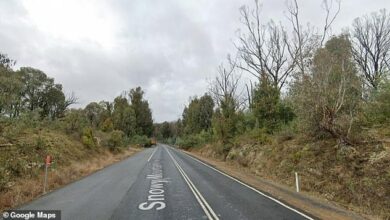I Own Seven Properties: Here’s Why It’s Unfair to Blame Landlords for Your Rent Hikes

A landlord of seven properties has criticised the idea that tenants are being ripped off during the housing crisis.
Jo Vadillo, a 50-year-old mother of three who rents out multiple homes, says many renters mistakenly believe that landlords are a privileged group who only squeeze their tenants.
“This is my biggest pet peeve: everyone is saying, ‘You rich landowners,’” she told Daily Mail Australia.
‘I do this very hard because I am a self-employed entrepreneur.’
Australia is facing a rental crisis. The vacancy rate in the capital cities is still at an extremely low level of 1.3 percent, while population growth is increasing. This leads to fierce competition for houses and rising prices.
Ms Vadillo, who owns houses, a block of flats and land in Brisbane, said tenants were unaware that landlords were often hit with unexpected costs. She pointed to a recent unexpected bill of $7,590 for the removal of a tree.
The Reserve Bank’s 13 rate hikes in 2022 and 2023 also caused monthly mortgage payments to rise by 70 percent, forcing landlords to raise rents to pay off their mortgages.

A landlord who owns seven properties has criticised the idea that tenants are being deliberately ripped off during a housing crisis (Jo Vadillo is pictured right with her husband Greg Vadillo)
If landlords are forced to sell their homes, the supply of rental properties may decrease, forcing tenants to look for other housing.
“The reality is that some people can’t pay their mortgages and have to sell their homes,” she said.
‘So you’ve already left home.’
But Ms Vadillo, the founder of purchasing agent Advocate Property Services, admitted that some unscrupulous landlords were using the rate hikes as an excuse to increase rents for no reason.
“Sometimes people are just rampant, I understand that happens,” she said.
“I saw it, but I didn’t do it.”
New laws come into effect in Queensland in July 2023, meaning landlords will only be able to increase rents once a year.
The law also prohibits new owners from raising the rent of existing tenants. Landlords are also prohibited from raising the rent of new tenants before the year is up, if the old tenants leave early.
“That’s the kind of control you need because there are definitely people who are pushing up prices, I have no doubt about that,” she said.

Jo Vadillo, a 50-year-old mother of three, said tenants often felt that most landlords were out to squeeze tenants
“Some people just lack integrity and don’t give a damn who they put out on the street, while I’d rather have good tenants and keep rent increases to a minimum.”
The landlord said that in one scenario, she only raised the weekly rent by $10, despite the property manager suggesting she raise the rent by $40.
“She’s a really good tenant, but she doesn’t make much money herself. Unfortunately, even the $10[raise]she got cost her money. That’s when I said, ‘Let’s not rent it at all,'” she said.
Ms. Vadillo, who was raised by a single mother who gave birth to her at age 17, said she saw real estate investing as her retirement savings plan.
“I didn’t get any financial support, my mother was a single parent when I was born, we really worked hard to get where we are, so I get really irritated when I see people say, ‘They’re just rich, they’ve taken all the rent from other people,'” she said. “This is my pension.
“I love real estate, I’m doing well, there’s no doubt about that, but I work very hard and have made many sacrifices to get where I am today.”
The Sydney landlord began her property adventure in 2002, at the age of 28, when she bought a two-bedroom apartment in the heart of Hurlstone Park for $315,000. At the time, she was earning $45,000 a year from her job in advertising.
In 2011, she co-founded Advocate Property Services with her husband Greg Vadillo. In 2015, she founded the educational group Property Women to help female home buyers.

Ms. Vadillo, who was raised by a single mother who gave birth to her at age 17, said she saw real estate investing as her retirement savings plan
Ms Vadillo’s investment portfolio includes a two-key home in Marsden, in Logan, south of Brisbane.
It has two sections with three bedrooms on one side and two on the other, giving a weekly rent of $980 as part of one lease.
She also owns two houses in Marsden and two plots of land in that area, with planning permission for the construction of two further dual-key houses.
She also owns an apartment complex in Redcliffe, bought with super.
The Vadillos have benefited from population growth in south-east Queensland through migration from other states after selling her investment properties in Sydney.
“The infrastructure there is phenomenal. There is a lot of migration between the states, so it’s like a storm that’s raging in Brissie,” she said.
The landlord, whose main residence is at Forestville on Sydney’s Northern Beaches, recommended fFirst home buyers may also consider an investment property in an affordable regional market to gain capital growth and high rental yields.
“If you have a provisional approval, you may not get into Sydney. You can just climb the ladder,” she said.
‘Buy in Maitland or East Maitland or somewhere in a regional hub like Tamworth.
‘You can get a good return in some of these areas. Let that nest egg grow while you’re living in Sydney.’
Couples buying their first home in Sydney to live in are also advised to look at homes worth more than $750,000 if they can afford it, rather than buying below that threshold. This will make them eligible for the state government’s $10,000 grant for first-home buyers.
A stamp duty exemption for first home buyers in NSW also applies to homes valued up to $800,000, with concessional transfer tax rebates for properties valued up to $1 million.
“I sometimes meet younger couples. If they have a joint income, they can borrow more. But they spend less in order to take advantage of government subsidies,” she says.

Ms Vadillo said the pursuit of government subsidies meant first-home buyers often bought an apartment or house further out of town, depriving themselves of meaningful capital growth.
‘People try to earn that amount of money to get their benefits.
“That’s bad economics: ‘I’m going to spend less than $750,000 and save on real estate transfer taxes.’ Their first purchase might be a more elaborate, larger home.”
Ms. Vadillo said that pursuing government subsidies usually means buying an apartment or house farther from the city and its value will not increase much.
“Capital growth, proximity to the city – young buyers also don’t understand how capital growth works,” she said.
Ms Vadillo said people looking to buy a home in trouble can always rent out spare rooms to help them keep paying their mortgage.
“People don’t want to do this, but they can sublet rooms, let others share the home and help pay the mortgage,” she said.
‘People just don’t want to live like that, it’s quite a sacrifice to pay off the mortgage.’




